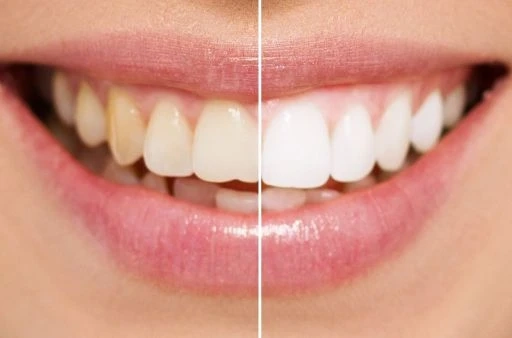Teeth whitening is a popular procedure that brightens your teeth and removes stains. Even a single teeth whitening session at Almond Dental can brighten your smile in several shades. Teeth whitening treatment is a dental procedure that doesn’t cause complications for most people. However, some patients have reported experiencing increased tooth sensitivity. This side effect may cause sensation while consuming hot or cold food and drink. Let’s cover some of the basics of tooth sensitivity, followed by a teeth whitening session. How long will the sensitivity last? The answer is — it varies from patient to patient.
Why do some people experience tooth sensitivity after teeth whitening?
To understand the sensitivity, let’s discuss how teeth whitening treatment works. The dentist applied a bleaching agent to your tooth’s surface during the treatment. This whitening agent penetrates the layer of your tooth, seeping beneath the enamel to the dentin. Since dentin is porous, the whitening agent tends to trigger sensitivity from the dentinal tubules.
Why does tooth sensitivity vary after a teeth whitening session?
Some people don’t feel sensitivity after having a teeth whitening session. However, others may experience this discomfort. The reason mainly depends on how healthy your teeth are. Since each patient is unique, some people have more discolored teeth than others. Likewise, each patient’s remaining tooth enamel and its strength vary. So the amount of tooth sensitivity you experience depends on your tooth enamel and dentin condition.
How Long Does the Tooth Sensitivity Last After the Teeth Whitening Procedure?
Tooth sensitivity after teeth whitening treatment usually lasts for a few days. However, the exact time duration of sensitivity after a whitening session depends on each individual’s unique case. Patients feel the increased intensity in the first days, but it fades away over time. You may no longer feel tooth sensitivity by the end of one week.
Managing tooth sensitivity after a teeth whitening procedure
While tooth sensitivity after professional whitening treatment isn’t permanent, you can easily manage it by using a tooth desensitizer and adjusting your diet.
Tooth desensitizer
Tooth desensitizer is placed on your treated teeth. This reduces the amount of intense tooth sensitivity a patient experiences on the first day. This is also one benefit of having a professional perform teeth whitening instead of doing it at home.
Adjusting the diet
Another way to reduce tooth sensitivity after whitening treatment is by adjusting your diet for a couple of days. Make sure to include soft foods and smoothies in your diet. You also need to avoid crispy, crunchy, and hard foods. In addition, it is advisable not to consume too hot or cold foods and drinks for the first few days. The extreme temperatures can likely cause discomfort. You can get back to your regular diet once the tooth sensitivity fades.
Determine whether teeth whitening is right for you
Once you visit the Maple Grove Dentist at Almond Dental, we will evaluate your teeth condition and help determine whether you’re the right candidate. After getting cleared for treatment, the decision to proceed will be entirely yours. Schedule a teeth whitening consultation today and let the professional assess your risk for post-treatment tooth sensitivity.
Related Topics:
Effective Ways to whiten your teethHow Long Does Teeth Whitening Last?How long does wisdom teeth removal take to heal?5 Biggest Misconceptions about Wisdom Teeth Removal You Must Steer Clear Of

